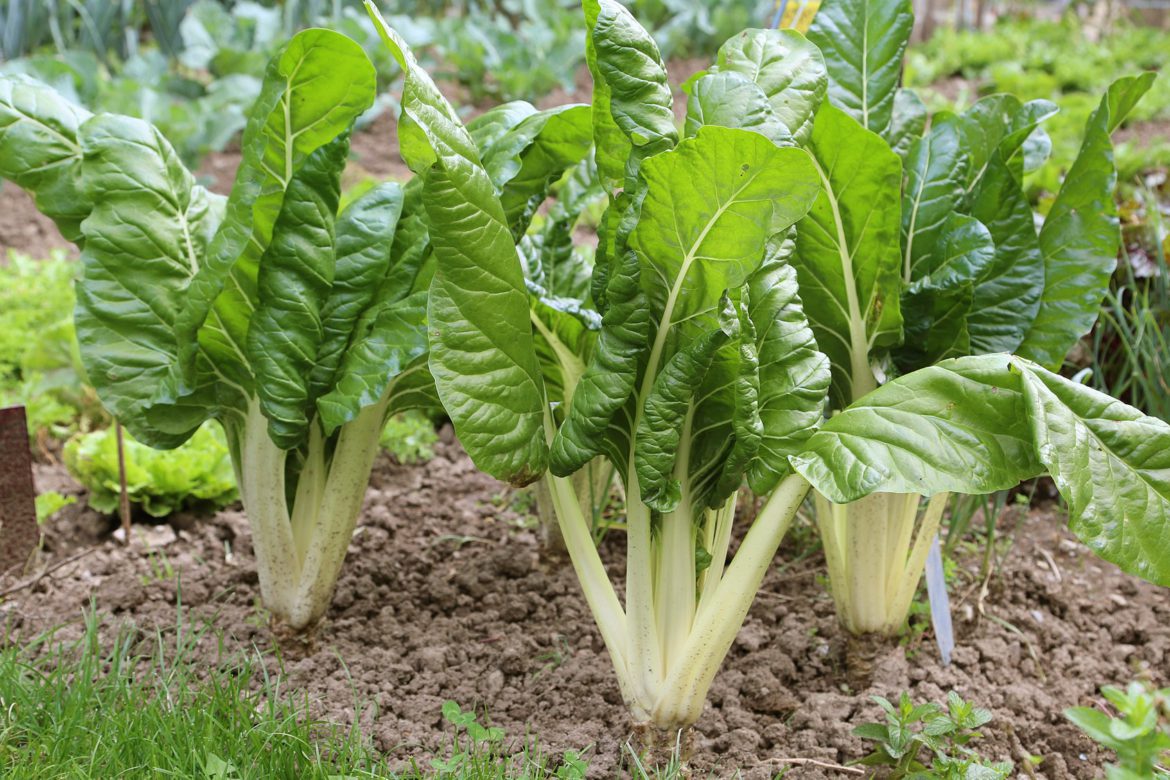https://cdn.steemitimages.com/DQmWkpA8wxVFuCbDtwoj9DsNHqxDaMTUHxwxBLTeppUb3dB/acelga_planta-1170x780.jpg
[source](https://www.huertosdesoria.org/tienda/wp-content/uploads/2017/02/acelga_planta-1170x780.jpg)

Chard is a perennial herb plant belonging to the Chenopodiaceae family, genus Beta, a vulgar species. They have wide spatula-shaped leaves, bright and intense green, with a clear central coast or, in certain varieties, reddish. Petioles are often red at the base due to the presence of betacyanin, and the stem may have a reddish color. Chard contains water, fiber, calories, mineral salts, particularly potassium, iron, calcium, phosphorus and magnesium. In addition to vitamin C, vitamin B1, vitamin B2, vitamin B6 and Niacin, vitamin A, vitamin E and vitamin K. Chard has antioxidant effects thanks to the presence of numerous vitamins, such as B2, B3 (niacin), C and K, and provitamin A (β-carotene): its percentages are not particularly abundant, except in the case of vitamin K, but in general they play an important role in protecting against the harmful effects of free radicals. Due to its antioxidant effects, the combination of plant substances such as lutein, chlorophyll and various other carotenoids is important. Lutein is a very common carotenoid in nature, responsible for the yellow-orange color. The chlorophyll present in the green leaves of the chard, during digestion, is transformed into antioxidant substances that play an important protective role against chronic degenerative diseases, including neoplastic diseases. In pregnancy, chard guarantees the supply of important substances for the mother and the child. They have remineralizing properties thanks to the range of mineral salts that contain, such as copper, potassium, magnesium, calcium and, above all, iron. During maternity, the need for iron is doubled and it is very easy to experience cases of iron deficiency anemia due to insufficient intake of this mineral: between symptoms, fatigue, paleness, tachycardia and poor ability to concentrate. Chard iron is particularly bioavailable and its absorption is facilitated by the good vitamin C content of this vegetable, so consuming beets during pregnancy helps prevent the risks of deficiency. Chard has a good folic acid content, important because it helps prevent neural tube defects of the fetus and, therefore, promotes proper development of the nervous system in the fetus. Folic acid is a coenzyme that comes into play in many cellular reactions and must be taken with food because our body is not able to produce it, if not minimally thanks to the action of bacterial flora. intestinal. Among other things, folic acid helps increase iron intake capacity, so taking it is doubly important for the future mother. Chard is rich in fibers that, in addition to giving a feeling of satiety, allow a regular transit of food and proper functioning of the intestine, resulting in a bit laxative. Fibers can also control the absorption of sugars and the assimilation of fats, so they are recommended not only to those who follow a diet to lose weight, but also to those who must keep diabetes under control. Chard is also considered an excellent purifier of the organism. In addition to improving intestinal motility, they perform a beneficial action for the flow of bile and promote digestion. Thanks to the good content of vitamin C and calcium, as well as vitamin K and magnesium, the chard counteracts osteoporosis and favors the good constitution of the skeletal system, strengthening bones and teeth. Vitamin K is also useful for keeping the nervous system healthy, as it participates in the development of the myelin sheath that protects the nerves. Thanks to the low sodium content and the richness of potassium, chard helps counteract high blood pressure. Chard, refreshing and diuretic, are known for their positive effects on the urinary tract and for their purifying properties: this makes them indicated in cases of cystitis and kidney diseases. They also promote the elimination of toxic substances and excess fats present in the body.

Originally posted here: https://steemit.com/farms/@luisalberto71/chard-and-its-benefits


No comments:
Post a Comment